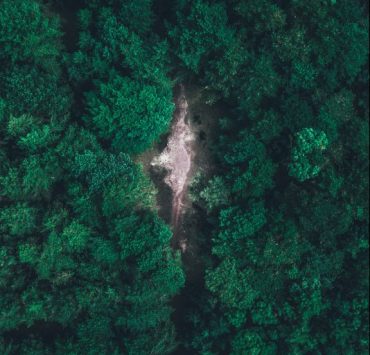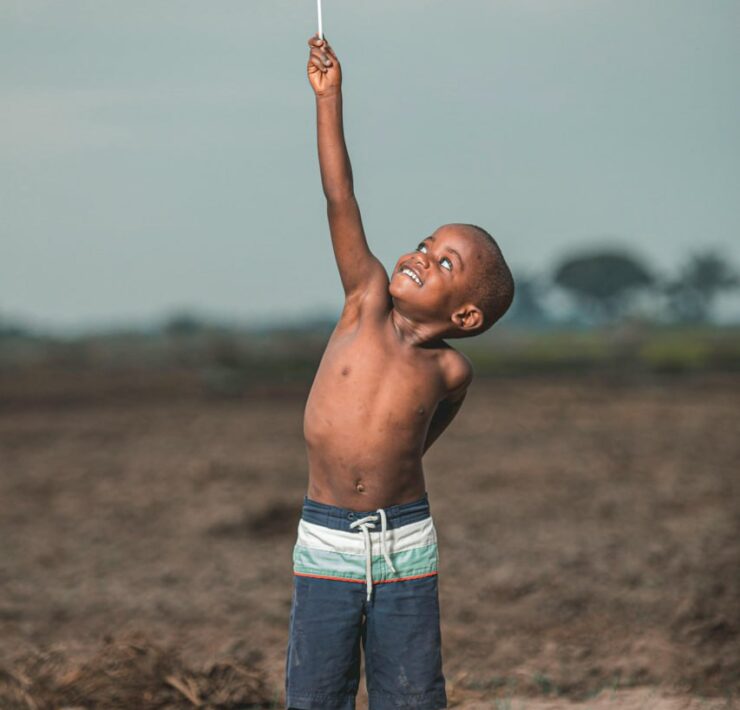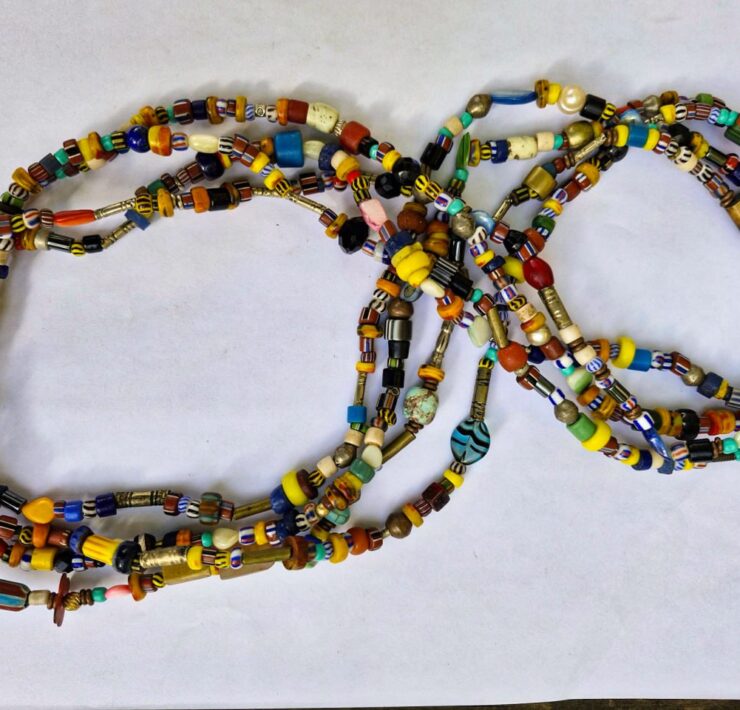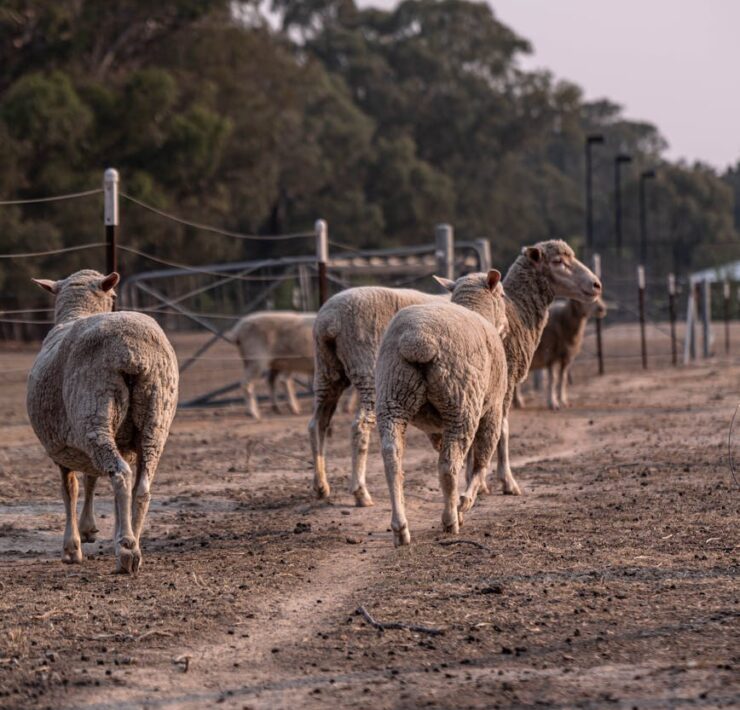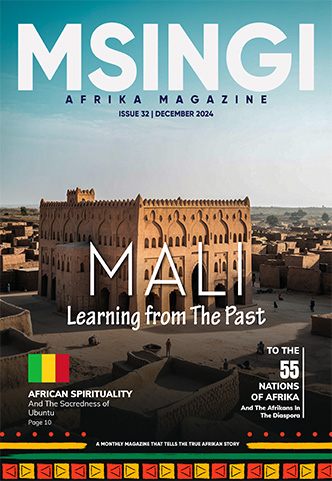Arorwet and Tendwet: The Amazing AfriKan Herbal Remedy for Infertility
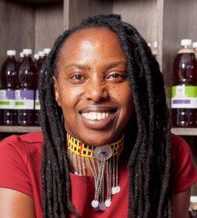
Chioma Phillips is the Editor of Msingi Afrika Magazine and…
Read Next
The solutions to Afrika’s increasing health crisis, don’t lie in complicated pharmaceuticals. They don’t rest in R&D projects that are worth millions or billions of
dollars, No! It’s so much simpler than that. We can heal our bodies and restore
our minds, and rebuild our immunity from the diversity of flora that we find in our
continent. It is that simple. So why not go back to what was working before we took
in what is killing us? Think about it!
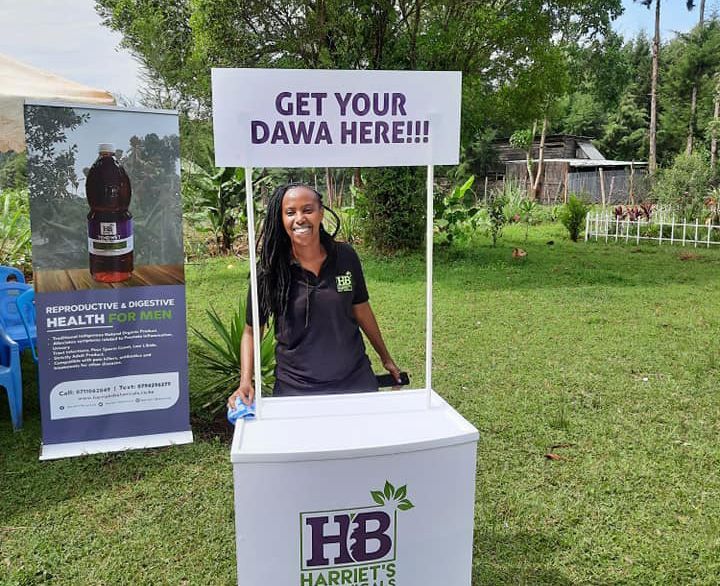
Tell us about yourself and how you got started.
My name is Harriet Ng’ok and I’m the CEO/Founder of Harriet’s Botanicals. And it’s very interesting how I came into this journey because I’m actually an investment banker, that is my background. I lived in England for fifteen years, I left here (Kenya) in 1995 and when I finished my education, I started working and started having this serious challenge with my, menstruation, a lot of pain agony, pain killers, and visiting doctors and gynecologists all the time. And it interfered big time with my work.
I was working in a very competitive environment. So, then what I started doing is if I went into a pharmacy, I would also go into a homeopathy, because the streets of London literally had all these varieties of different things you could try. So, if the pain killer wasn’t working, I thought maybe a homeopathic tablet would work or maybe some yoga would work or some massage. And that is when I got very familiar, with the medical element or all the different treatments that are available for women with difficult periods.
Now what I didn’t know at the time is that difficult periods are associated also with infertility – primary or secondary – because most of the time you’re suffering from some type of hormonal imbalance which will cause the growth of fibroids and the growth of cysts. You could be having PCOS, Polycystic Ovary Syndrome or endometriosis and there’s so much pain associated with that, or adenomyosis. I didn’t know that at the time; people just normalize pain around your period. You take your painkillers, you’re bleeding so much and you’re losing iron, and you’re feeling weak, you have a headache, you have PMS, you have mood swings, you’re very difficult to live with, the week before and sometimes during the week of. It wasn’t treated as serious problem. So fast track, I became one of those people who was like a concoctionist because I used to also do juicing, sometimes I was vegan, vegetarian, I was just doing fruits. When I was doing that, all I was trying to do was ease my own pain, so going on a 21-day juice fast, the whole idea was that my period would be better. I became the kind of person who could make things, who could make essential oils. I started learning how to make tablets.
Wow! This is survival.
Yeah. For me it was just survival but that was what was happening in my kitchen. When I came home again (to Kenya) every month I would be laid out for 4-5 days, and the week before I’d have crazy mood swings. I mean, my mood was interfering with my life because that’s when you sought of like ‘kosana’ (disagree) with everybody, you’re always mad at people and you people don’t understand what’s going on with you.
So there’s a lady who was working for us, and she suggested that her uncle who was a herbalist had some medicine; we used to call it Webuye because it comes from there. So Webuye was brought and I experienced like 25 percent less pain, and that was my introduction to traditional herbal medicine. Fast track I was given medicine from Keiyo, Marakwet; there’s medicine you take and then you vomit for days. The whole idea is that it’s supposed to clean out your tummy, get all the toxins out, that’s what supposed to be causing the cramping, making you uncomfortable, the bloating, the gas, the excess water retention.
Then later on during my father’s funeral, I got introduced to our own Kipsigis herbs. And there’s a lady who brought them to me because I was really suffering. It was pretty obvious something uncomfortable was happening. So when she brought them I experienced, for the first time, a painless period, like the first time in my life and that was a long time. When this happened, I rushed back to get some and gave them to a friend. And my friend, who was on her way to a hysterectomy, now she experienced her first painless period.
She shared this information with a Whatsapp group, and that is how my business was born. People were like: give it to me, my cousin, my sister, my aunty, and the same group encouraged me to develop a men’s product, because they were like; well I’m feeling good, but what about my husband? So I developed a men’s formula just off the back of my head, thinking about what typically would go into a men’s formula with the focus on the prostate, because just the same way women are suffering from reproductive health issues, men are suffering as well. And even whether it’s low sperm count or erectile dysfunction or poor libido, those are the same markers women have: poor egg quality, or they don’t produce eggs at the right time, when they have this problem they are not interested in sex at all, that’s when they call it ‘I have a headache’. And you find women are doing so many things to manage their pain, they’re taking lots of painkillers, or they could be drinking alcohol. You find that, the week before that’s when they start drinking lots of wine, trying to manage their mood and their pain.
Somebody else encouraged me to go to the University of Nairobi pharmacology department, to have my mixture tested and looked at, get the scientific names, analyze what’s in them and why they behave the way they do. I did just that and got my certification, after which I was allowed to advertise on social media.
The more you interact with your own herbs from your own culture, the more you discover other things. So I decided to use the Kipsigis names to immortalize the culture, so that anybody can look at that tree, let’s say it’s Arorwet or Tendwet and know; this is medicine. You know like if 100 years from today people will still have a record of what it was we were doing, they can see it online and they’ll be like, wow, these people were doing XYZ, it’s knowledge that’s not forgotten. It is part of documenting and archiving our knowledge.
The more you interact with trees, the more the trees communicate with you and you soon begin to know which is for which, and I continue to develop more and more products.
That’s amazing. What is Arorwet and Arorwet?
So Arorwet is ‘Cape Ash’, that’s the English name, Tendwet ‘Prunus Africana’ and Prunus Africana is well known for the treatment of prostate cancer, for men over 50 in Europe. There was a time 20-30 years ago, people were harvesting forests of Prunus Africana and exporting them.
What I found very interesting is nobody ever thinks of the African market. People come to the forest and discover an amazing thing, and the first thing they want to do is sell it to a French pharmaceutical, or next thing it’s being retailed in New Zealand. So how come nobody ever thinks of us? When I lived in London, none of those doctors ever thought of me as a black African woman, to figure out what were my needs. I discovered that fibroids are a predominantly black woman illness and prostate cancer is a black man’s disease.
It’s not very high up on the marker for what they are trying to find the treatment for abroad, because it doesn’t affect their population predominantly. So you walk around talking to black women and they all have fibroids. I thought, but this crazy, how come everybody experiences this?
Once I got rid of my pain, it completely transformed my life. I don’t lose any time in the month, I can work when I’m on my period, I can go to the gym, I can do every single thing. There’s no difference between the day I’m on my period and another day, nobody can tell. My energy is always high, I’m always happy, I’m always excited, my relationships improved, my financials improved, my work improved, everything got better. And this is why I tell people our products are transformational, and the same with the men’s products.
Guys now in their 20’s are struggling with erectile dysfunction, either they’re taking a lot of steroids, or they’re pumping too much iron, they’re eating all the wrong foods, or they’re using too much Viagra. So you find…
What? 20?
Yes! It is, you know for various reasons it’s just like a lifestyle. Maybe they’re just like sleeping with too many women, so there’s so much of this going on. When you transform even a guy’s life, say he wasn’t performing that well… when men don’t perform well with their significant other, you just find everything else goes down; their lives go down, their mentality, their outlook, their confidence. So then again this is supposed to bring back like that Alpha male, you know like, ‘I can do it.’ It transforms everything, their career, their finances, their emotions, they sleep better. It’s transformational, and that is what I was trying to do.
With the reproductive health and I just think reproduction is the core.. like literally that is our grounding. We all are human beings and literally our thing is that we can reproduce, we can create another generation. And when I talk about creation I know that if you’ve got your libido is good, you are active, you’re interested in life. It changes everything, so you may not be creating a baby but you’re creating projects.
You’re creating life! In so many different ways.
Exactly! So that is sought of like the gist of the two products that we have.
The amount of social pressure and tension that actually exists, I’ll say in Afrika around this issue has been really high and this causes a lot of social like disruption, violence, infidelity and who knows?
Absolutely! I mean, we hear heartbreaking stories. Because at first I thought I was treating women of a certain age, over 40s because of early menopause, at 38 or 42 really you shouldn’t be experiencing menopause. So I thought my demographic was going to be this group of women who have already had their babies, and they just want to feel good, they don’t want to get the hot flashes, they want to get rid of the insomnia, and you know, they just want to live normal lives. But funny enough, my biggest demographic is women in their 20s who have abused emergency contraception and are now infertile, experiencing multiple miscarriages.
So then you begin to learn that there’s this group of people who are so stressed because they are newly married and they are infertile, they are 23, 22, 24. They are infertile and they don’t understand why. That is when I learnt about blocked fallopian tubes. I’d never heard about it when I was in my twenties. I knew you could have painful periods, I didn’t know you could have blocked fallopian tubes, I didn’t know about ectopics, I didn’t know about the emergency contraceptions, nobody was on the emergency contraception in the 90s. Nobody ever said P2, but today I’m like, what!
Then you discover there’s this culture of having sex without intending to get pregnant but using protection, and using emergency contraception like normal contraception and once you’ve abused this it leads to the ectopic pregnancies, multiple miscarriages we’re seeing all the time.
The same demographic has erectile dysfunction in the young men due to excessive alcohol intake, or the wrong lifestyle, now you’re talking about, ‘he can’t do it’, he can’t produce a sperm that will make you pregnant. You see it’s such a serious problem and it’s unbelievable. Once you’ve heard the stories you’ll just change your whole outlook about what’s going on around. Because that is not going on for you, or you’re not hearing from your peers, but now when you hear there’s this group of people struggling with these kind of things which you didn’t struggle with in your 20s, then it changes everything.
You’ll be surprised how many women have gone and had a shot, for they say that; ‘I’ve had two children then I wanted to have a break, so I went and got this implant or I went and got Depo.’
Then they’ll say; ‘My period has disappeared and I want more kids and I can’t get the third one, my husband is stressed, so he thinks I’m sleeping around.’ There’s infidelity charges, the family is broken because I can’t continue having the babies that he wants. I mean, it’s emotions, it’s psychological, it’s everything, it’s a family unit getting totally destroyed by infertility: primary or secondary.
That’s devastating. So diet, use of secondary contraceptions, use of Viagra and anything else?
Use of normal contraceptives, change of environment, you know, like stress is a big one. Because remember that now we’re living a life where we’re chasing money all the time and the stress we put on the body is unbelievable, we’re on the go all the time, as opposed to relaxing. I mean, there are people who buy Arorwet, then they’re like, ‘Oh my God, he’s stressing me.’ And I’m like, you know, for you to get pregnant, you must be relaxed for you to conceive, and for you to create an environment that will hold a baby, you must relax. So you have to bring in counseling; we have the counseling element to our business as well, where we can tell people; ‘You’re not less of what you are just because you don’t have a baby.’
Right! Because the primary thing is actually to make your body healthy. It’s not so much about having babies, it’s about making sure your body is functioning the way it’s supposed to.
Absolutely!
And these products seem to do that, because reproductive and digestive health deals with the endocrine system, that’s everything from the head all the way down.
Well, that’s how they are created, because that’s when you really discover how smart our ancestors were, because they were creating products that deal with you holistically. It is the same thing with the digestive system, it impacts the reproductive system big time. That’s why if your period is painful, more than likely you’re bloated, or more than likely you’re not passing enough stool, you’re not having bowel movements. You’ve got all this stuff stuck in your stomach and then it presses on the reproductive system. So it’s all interrelated, and that is how they treated it.
And also inflammation, because if you’re dealing with prostate issues then you would be trying to just help settle the body so it can do what it does best.
Maybe you can tell us a little bit about how the products work, for those who are a little anxious about using herbal remedies. What does it do inside the body once you take it in, and what does it work on and what changes does it bring about?
Okay, so like Arorwet itself has actually got eight trees. Arorwet for me is the base, used for treating digestive issues in the village and also for washing babies. It’s quite interesting that the Kipsigis do that where when the baby is really small they wash them in herbs and Arorwet is critical for that. Those herbs all do different things and they work together synergistically to do something together and to do something individually. In there, first of all, there’s something for urinary tract infections, because with the amount of sugar we eat in our system Candida is now recurrent. Women get Candida every month along with the sores with the pain, because they itch and they scratch. It doesn’t even get time to heal before the next cycle. So what’s happening inside is that it’s scarring, which brings the tubes together. The first thing is to get something that clears that urinary tract infection from your system, because sometimes you go to the pharmacy and you get the topical application, you put it on you feel better, but it’s still in there, that’s why it flares up again. Second thing is to change the pH of the body, because if it’s acidic we’re moving it into an alkaline state, and things like those infections don’t survive in an alkaline state. So taking dawa (medicine) does that automatically by just shifting your pH balance. It stops the reinfection and the scarring, and then it has another thing in there that’s like a decongestant that goes in there, and softens those scars and then they come out; that’s when people say they had a discharge or brown things coming out of the body. When the same decongestant sees a fibroid it knows this is a foreign element and it’ll go in and start to soften it, and it will start to come out as clots or just like flesh.
I feel like Arorwet is this way to first calm the physical body down. When the physical is calm you begin to notice, you listen more to yourself. If you’re tired, you rest, so, you begin to give yourself a lot of wellness, you begin to feed back wellness to your body. You begin to eat better, it makes you thirsty, you drink more water, it makes you hungry, you feel like eating fruits, you find yourself nibbling on fruits all the time, so it changes your palate, it restores the body back to factory settings.
So, what would your advice, or your counsel be to Afrikans who are basically getting hooked on conventional medicine.
Well, really we’re speaking to the middle class, because it’s the middle class who are living in apartments in the cities disconnected from their grandmothers and grandfathers, who don’t speak an Afrikan language anymore, don’t eat Afrikan food. You’re talking to that person to who food is a burger and chips, and medicine is a panadol, or anti-histamine. So my first thing is I think is the return to natural food, the traditional vegetables hold a lot of nutrients, drink a lot of water, eat a lot of fruits and begin to engage with your culture, that is how you’ll return also to traditional medicine.
Traditional medicine is making a big comeback, mainly because allopathic medicines are not working for everything, there are no cures for cancer, there’s no cure for blood pressure and diabetes, you just keep taking the medication forever until some point it ruins your kidneys.
So, you have to be on a preventive mode, taking things like Arorwet or Tendwet, or even your Moringa, or your Neem, taking things that prevent you getting sick in the first place, things that prevent you accumulating cholesterol in your body. Adopting a diet that suits you, that your ancestors adopted, that’s what you should be looking at, and that mentality will lead you home and to the right solutions for you.
Any last words for Afrika and the world?
For me, what’s coming to pass like especially now that you see, what we went through in 2020 with the COVID 19 situation. I think you can be sitting in your house thinking what to do to prevent your children from getting sick, and they have to go out there, they have to go to school, they have to interact with others. I’d say reach for the traditional remedies , even if it’s just preventative and look after yourself. I say your culture is your immune system. There’s an Afrikan renaissance, a cultural of renaissance taking place right now. You know it’s like we’re coming back and this is who we are.
Find out more about Harriet’s Botanicals and contact them at
www.harrietsbotanicals.co.ke
Watch the full interview at Msingi Afrika TV on YouTube at
Subscribe now for updates from Msingi Afrika Magazine!
Receive notifications about new issues, products and offers.
What's Your Reaction?
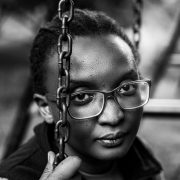 PIN IT
PIN ITChioma Phillips is the Editor of Msingi Afrika Magazine and the host of Msingi Afrika Television. Her hope is to see the Truth shared, with all who will listen, for the transformation of the people and the continent of Afrika - and the world. She believes passionately in the critical role that Afrika and Afrikans have to play on earth right now and hopes to ignite the spark that will cause them to see and believe who they are, so that they can live out their Truest lives for the remainder of their days.

















